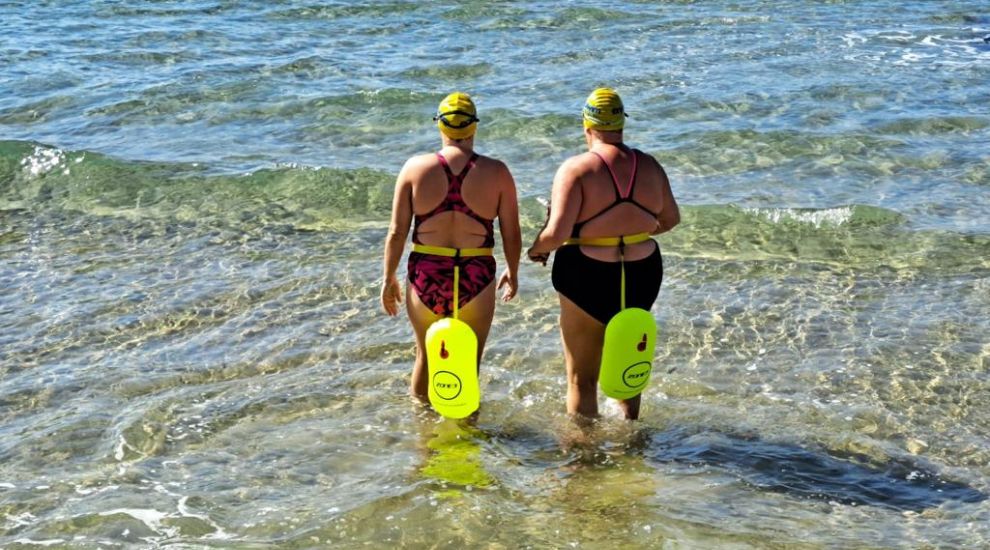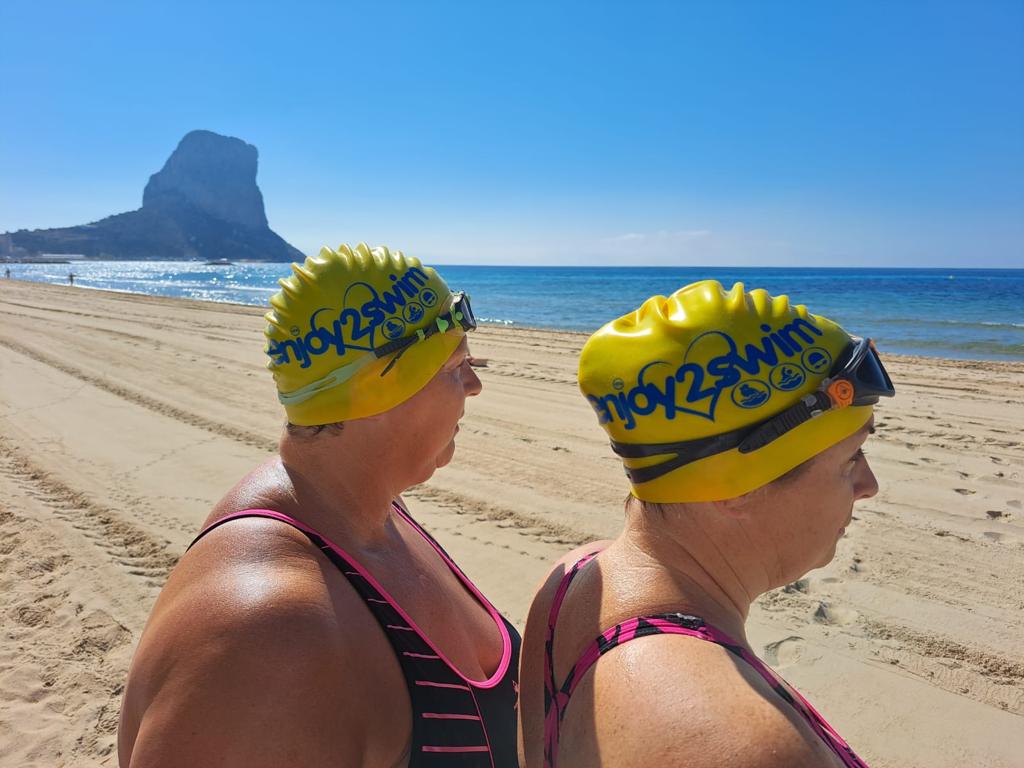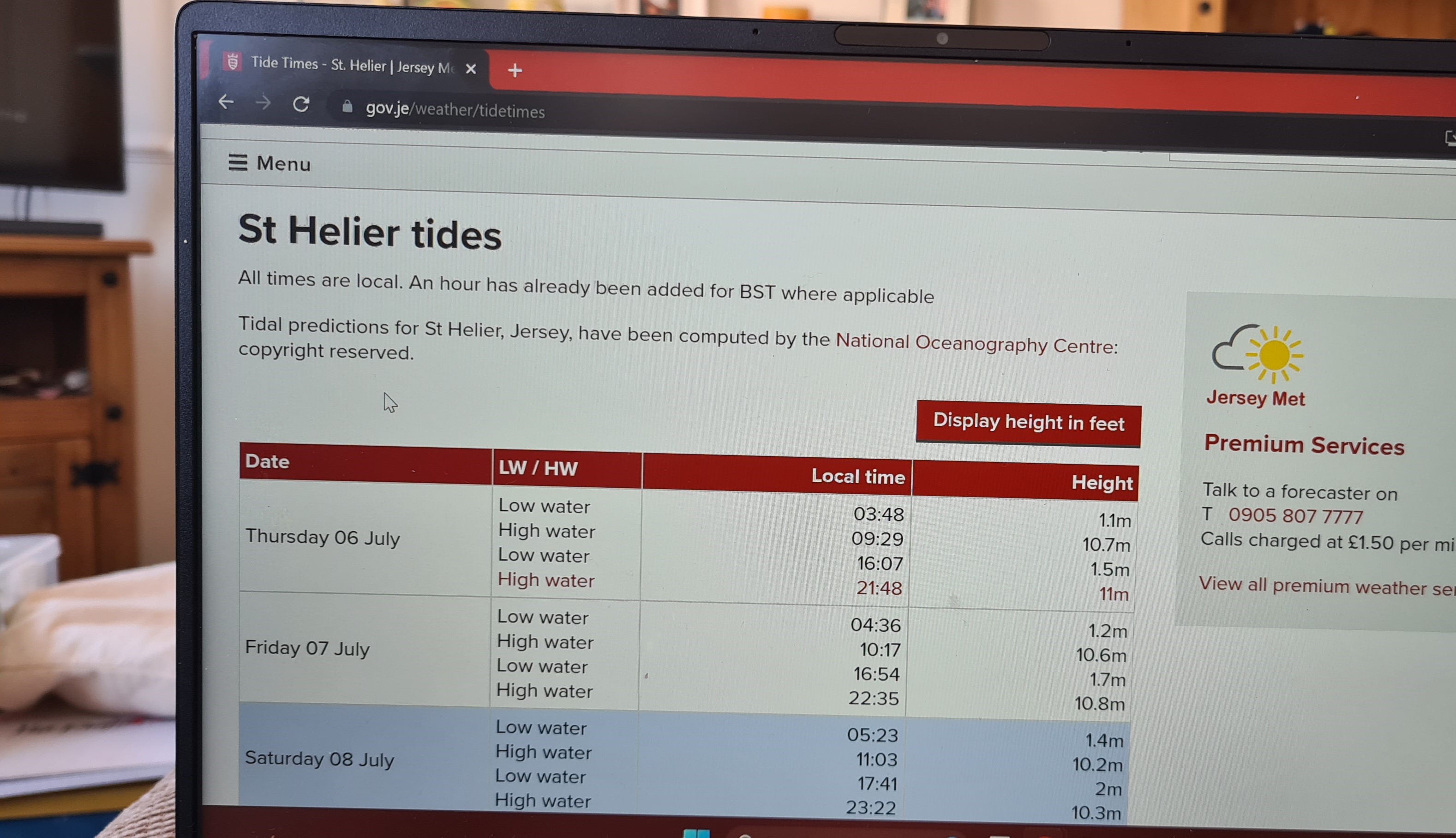


Two top local swimming instructors have opened up about how the sea helped them through trauma and cancer recovery – and shared their tips for islanders looking to improve their wellbeing by embracing the deep blue too.
Nicky Holgate-Smith has been a swimming instructor for 20 years and founded enjoy2swim, where Wendy Trehiou, who is passionate about swimming, is also an instructor.
Both are very familiar with the benefits of open water swimming, which is the fastest growing outdoor sport whether for physical fitness, mental wellbeing or both.

Pictured: Nicky and Wendy are both swimming instructors at enjoy2swim.
If “reconnecting with mother earth and the beauty Jersey has to offer us” is not enough, the pair say the wellbeing benefits of sea swimming, "bobbing" or training for a big event also include:
managing anxiety, stress and depression
increasing alertness, clarity and energy levels
releasing happy hormones
feeling of personal achievement
sense of belonging especially when meeting up with other like-minded people
clearing the mind and freeing the spirit
a feeling of freedom
“My mental wellbeing is my everything having been exposed to trauma, one of which was the experience of watching my father slowly fade away from motor neuron disease in 2007,” Nicky explained.
“I also had an emotional breakdown in 2011 which required counselling. During this time, I realised the benefits of regular exercise, although the ocean became my passion and my place to go to feel a sense of healing albeit in the surrounding of good company and a good laugh.”
Meanwhile, Wendy’s hobby has always been swimming. Having suffered from breast cancer and a heart condition, she found in the ocean “a safe place to support my mental health through recovery”.
“It was really important to me that I could ‘get my fix’ as this alleviated the stress and anxiety of coping with a serious illness,” she explained. “I also know this is paramount to my management of anxiety today and I always know that if I'm struggling, it's time for me to head to the ocean and appreciate my surroundings and gain my freedom!
“I always swim with someone that knows me and understands that some days I just need to be with my own thoughts but also know that we are there for one another.”
Using their skills, understanding and empathy to support those through adversity, Nicky and Wendy share their knowledge and experience to help others enjoy the ocean, be it purely for mental wellbeing, learning to swim or training for an event.

Pictured: Swimmers should check the weather and tides before going out.
The pair are themselves currently in training as part of a six-strong team - cheekily named the 'Tots' ('T*ts on tour') – who will be completing a 14-mile relay from Jersey to France in aid of two animal charities.
Among the group are four amateurs, who have never swum in open seas before.
Even as advanced swimmers, safety always takes priority for Wendy and Nicky, and with many islanders taking to the water in the summer – including as part of Jersey Hospice Care’s 30 bays in 30 days – they have shared their top tips on how to stay safe in the sea and urge everyone to take note:
Never swim alone
Always tell somebody where you are and what time you will be home
Do a weather check as well as understand the time of high and low water - high tides bring a more powerful sea, rip tides and currents. On the bigger tides, waves may crash off the walls making entry and/or exit more challenging, however it also makes for a lovely swim with little distance to walk to be in the water. Low water on the other hand may mean a long walk just to the water’s edge which needs to be factored in when exiting the water and how long it will be before you can get to your towel and warm clothes.
Swimming at low water may expose you to more rocks dependent on where you swim and bystanders will be less likely to be close by.
Swim at a lifeguarded beach and between the red and yellow flag.
Swim parallel to the shore - concentrating on swimming parallel to the shore reduces the risk of you drifting out too far, avoiding motor traffic and strong tidal currents. Swimming in bays and parallel to the shore should allow for a safe exit at any point should you feel unwell.
Pictured: "Swim at a lifeguarded beach and between the red and yellow flag."
Check your entry and exit points - You need to be confident it is safe not only to enter but also to exit. The state of tide could impact your entry/exit. What will you do if the exit isn't safe when you return? What is the alternative exit point? This is more likely to be challenging on a big rising tide.
Undertake your own risk assessment everytime you swim
Always be aware of other users of the bay including motorised and non motorised traffic
Be aware of the water temperature - it will have an impact on the core body temperature. Cold water is considered to be below 15 degrees Celsius, however if you are not acclimatized to cold water immersion/swimming this can be even higher. The human body regulates at 37 degrees Celsius so time in cold water should be built up carefully over time. Don't consider anything more than five minutes for the first swim/bob. Just because it's a sunny day doesn’t mean the sea is warm.
Understand acclimatisation and practise this - this is the process where the body gradually adapts to cold water through repeated exposure. Through acclimatization, it’s possible to greatly reduce or eliminate the chance of cold water shock. Dr Heather Massey of Portsmouth University says the secret to acclimatization to cold water is to swim in it at least once a week and preferably two to three times a week and gradually extending the time you are in the water. This process should not start during the winter months when the sea is at its coldest.

Pictured: The water temperature has an impact on the body core temperature.
Wear a swim float and a bright coloured swimming hat
Wear a watch so you know how long you have been in the water - by wearing a watch you will know how long you have been exposed to cold water and it is another way to ensure you don't overstay in our beautiful Jersey waters
Always have layers to rewarm post swim (Even when the sun is shining you may feel cold post-swim)
Take a hot drink for post swim
Do not block slipways from emergency service access
Always have the right equipment before entering the sea. Local providers can help you and ensure the right fit for you with things such as goggles and wetsuits.
If you do get in trouble, float on your back and shout for help
If you see someone else in difficult dial 999 and ask for the Coastguard
Nicky and Wendy say they are delighted to help and guide anyone who is nervous about trying open water swimming, wants to improve their wellbeing or simply expand their swimming horizons. Their website is here.
Comments
Comments on this story express the views of the commentator only, not Bailiwick Publishing. We are unable to guarantee the accuracy of any of those comments.